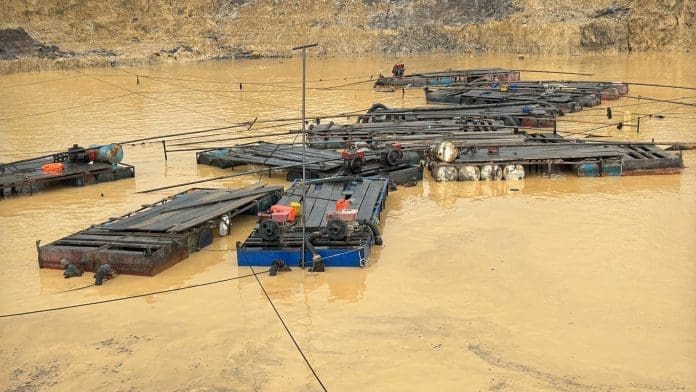Lawyer Kow Abaka Essuman has called for an urgent, non-partisan approach to tackling illegal mining, describing Ghana’s environmental degradation as heartbreaking and warning that political gamesmanship threatens meaningful progress.
Essuman, a New Patriotic Party member, characterized galamsey as a national matter requiring unity beyond political lines, speaking on Starr Chat with Bola Ray in an interview monitored by multiple media outlets. His comments come as Ghana’s rivers and forests continue suffering devastating damage from unregulated mining activities.
The lawyer painted a vivid picture of the environmental destruction he’s witnessed during recent travels. Flying over Takoradi reveals what appears to be brown water flowing through the country, while nighttime drives through Chibi show people emerging from bushes in Wellington boots, evidence that illegal mining operations continue unabated.
Essuman suggested that technology could play a critical role in cleaning polluted water bodies and reclaiming destroyed lands, noting that previous administrations initiated such projects. He urged current policymakers to build on existing knowledge rather than starting from scratch.
The environmental crisis extends beyond ecology into human tragedy, according to Essuman. Young men involved in galamsey view it as quick income in the absence of formal employment opportunities. This reality, he argued, demands stronger investment in alternative livelihoods and comprehensive reclamation initiatives.
Essuman acknowledged that his administration faced accusations of politicizing the galamsey fight, but he believes the current government confronts similar challenges. If authorities honestly accept mistakes made in politicizing anti-galamsey efforts, they could bring diverse stakeholders together for more effective action.
The lawyer proposed including past policymakers and experts who developed previous anti-galamsey strategies. New administrations often fail because they attempt to reinvent approaches rather than learning from prior experience, he observed. Lessons from earlier efforts could prove vital to reversing environmental damage.
Mining represents one of Ghana’s biggest foreign exchange earners, making complete elimination impossible. However, the methods for handling illegal operations must change fundamentally, Essuman insisted. Governments must resist temptations to weaponize the issue for electoral advantage.
He advocated for a regional approach given that illegal mining affects several West African nations. International conversations about treating water bodies and preserving forest areas could yield more sustainable solutions than isolated national efforts. Technology transfers and shared best practices might accelerate progress across borders.
Effective enforcement and open collaboration across political divides represent Ghana’s best hope, according to Essuman. Depoliticizing the issue, bringing everyone on board, and adopting appropriate technology could solve the problem, though he acknowledged the challenge remains formidable.
The lawyer’s appeal for unity comes amid intensifying pressure on government to demonstrate serious commitment against galamsey. Civil society groups and organized labor have threatened industrial action if authorities fail to take decisive action. Recent operations by the National Anti-Illegal Mining Operations Secretariat have yielded arrests and equipment seizures, yet questions persist about long-term effectiveness.
Ghana’s major rivers, including the Pra, Offin, and Birim, remain heavily polluted from mining activities. Water treatment costs have escalated dramatically as pollution worsens, threatening water security for millions of Ghanaians. Some communities face acute shortages of potable water due to contamination.
Forest reserves have suffered equally devastating damage. Cocoa-growing areas have been stripped for mining operations, threatening Ghana’s position as a major cocoa producer. The environmental degradation carries economic implications that extend far beyond immediate mining revenues.
Previous anti-galamsey initiatives, including Operation Vanguard and Operation Halt, struggled with allegations of corruption and political interference. Personnel deployed to combat illegal mining reportedly accepted bribes, allowing operations to continue. These failures underscore Essuman’s arguments for structural reforms and political neutrality.
The challenge of providing alternative livelihoods for those involved in galamsey remains complex. Many illegal miners come from communities with limited economic opportunities. Without viable alternatives, enforcement alone may simply displace activities to new locations rather than eliminating them.
Technology for water treatment and land reclamation exists, but deployment requires significant investment and political will. Some pilot projects have shown promise, but scaling these solutions nationwide demands sustained commitment and adequate funding. International partnerships might accelerate technology adoption and knowledge transfer.
Essuman’s call for depoliticization reflects broader frustration with how partisan considerations have undermined environmental protection efforts. When political parties view galamsey primarily through electoral lenses, long-term solutions become secondary to short-term political calculations.
The lawyer’s proposals for inclusive dialogue and knowledge-sharing offer a potential pathway forward. Bringing together experts from different administrations, civil society representatives, mining communities, and environmental advocates could yield more comprehensive strategies than partisan approaches allow.
As Ghana approaches another election cycle, the question remains whether political leaders can rise above partisan interests to address this existential environmental threat. Essuman’s appeal represents a test of whether Ghana’s political class can prioritize national welfare over electoral considerations.
The environmental damage already inflicted will require decades to reverse, even with optimal interventions. Water bodies need extensive treatment, degraded lands require careful reclamation, and forest ecosystems must be painstakingly restored. The longer decisive action is delayed, the more challenging and expensive remediation becomes.
Source: newsghana.com.gh











